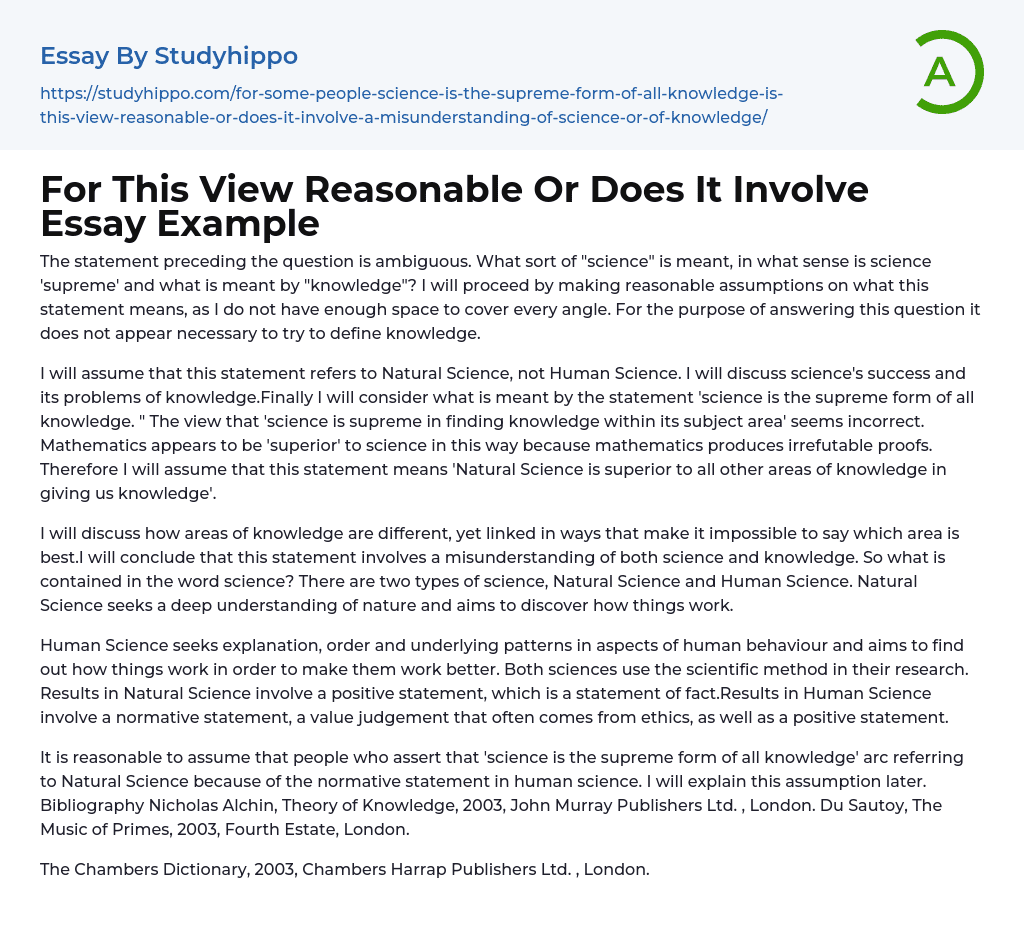

For This View Reasonable Or Does It Involve Essay Example
The meaning behind the statement prior to the question is uncertain. There is uncertainty about what is meant by "science," in what capacity science is 'supreme,' and what "knowledge" entails. Due to limitations of space, I will make logical deductions about the intention of this statement. Defining knowledge, for the sake of addressing this question, seems unnecessary.
In this statement, the main focus is on Natural Science rather than Human Science. The discussion will cover both the triumphs and obstacles of science in terms of gaining knowledge. The ultimate aim is to investigate the notion that 'science is the supreme form of all knowledge.' However, it seems that this perspective may not be entirely precise, as Mathematics can produce undeniable proofs and could be viewed as 'superior' in this aspect. Therefore, we can assume that the intended meaning of the statement is that 'Natural
...Science exceeds all other areas of expertise regarding its capacity to furnish us with knowledge.'
The topic being addressed pertains to the differentiation and connection between areas of knowledge, rendering it impossible to determine a superior field. It will be concluded that this approach reflects a misconception regarding both science and knowledge. The term science encompasses two categories: Natural Science, which strives to gain a comprehensive comprehension of nature and uncover the mechanics of how things operate; and Human Science.
Human Science and Natural Science both utilize the scientific method in their research, seeking to better understand various aspects of the world. Natural Science focuses on discovering facts through positive statements, while Human Science aims to evaluate behavior and offer value judgments through the use of normative statements that often stem
from ethical considerations.
Assuming that those who claim 'science is the ultimate form of knowledge' are primarily referring to Natural Science due to the normative statement in human science. Later, I will elaborate on this assumption. Nicholas Alchin's Theory of Knowledge (2003), published by John Murray Publishers Ltd., London, and The Music of Primes (2003) by Du Sautoy, Fourth Estate, London are cited in the bibliography.
This is the Chambers Dictionary published by Chambers Harrap Publishers Ltd. in London in 2003.
- Age Of Enlightenment essays
- Ethos essays
- Time essays
- Acceptance essays
- Meaning Of Life essays
- Reality essays
- Natural Law essays
- Political Philosophy essays
- Utilitarianism essays
- Existence essays
- Free Will essays
- Good And Evil essays
- Confucianism essays
- Relativism essays
- Conscience essays
- Environmentalism essays
- Empiricism essays
- Epistemology essays
- Ethics essays
- Existentialism essays
- Human Nature essays
- Individualism essays
- Metaphysics essays
- Philosophy Of Life essays
- Transcendentalism essays
- Truth essays
- Destiny essays
- Determinism essays
- Fate essays
- Functionalism essays
- Philosophers essays
- Pragmatism essays
- Future essays
- Child Observation essays
- Critical Reflection essays
- Teaching Philosophy essays
- Personal Philosophy essays
- Action Speak Louder Than Words essays
- Can Money Buy Happiness essays
- Values of Life essays
- Ethical dilemma essays
- Normative Ethics essays
- Virtue Ethics essays
- Belief essays
- Deontology essays
- Moral essays
- Virtue essays
- Work Ethic essays
- Henry David Thoreau essays
- Carl Jung essays



